高一英语必修三unit2知识点
- 格式:ppt
- 大小:269.00 KB
- 文档页数:20

Unit 2 Healthy eatingdiet n.日常饮食vi.节食get over 克服;复原be/go on a diet 节食get through 完成;通过put sb. on a diet 使某人节食get together 聚会;收集a healthy diet 健康饮食get up 起床;组织;筹划diet & food lie& laydiet 定量定质的食物,food 食物统称lie(平躺;位于)---lay---lain --- lyingnut 可数+s lie(撒谎) ----lied----lied ---- l yingprotect (v.) sb. from harm 保护某人免收伤害lay(放置;搁;产卵)---laid----laid -- laying under the protection(n.) of 在…保护下lie on the floor 躺在地板上(紧挨着)protective adj. be protective of sb. 保护某人down 躺下in 位于(一个范围内);在--- balance vt.& n. to(不接壤)weigh sth. in the balance 用天平称某物tell a lie 说谎a white lie 善意的谎言lie to sb. keep one’s balance 保持平衡at a discount 打折lose one’s balance失去平衡give/get/offer a discount 给予、得到、提供折扣on balance 总的来说consult sb. about sth consult with sb.(about/on sth.) be out of balance 失去平衡earn one’s/a living =make one’s/a living 谋生balanced(adj.平衡的,平稳的)diet 平衡膳食earn fame 赢得名望fried(adj.油煎油炸的)fry 的过去式和过去分词one’s respect 赢得尊敬He looks so sad; I oughtn’t to have told him the bad news so early. Earn moneyOught he to see the doctor? Yes, he ought to. No, he doesn’t have to. /needn’t. earn&gain&win Put on /gain weight 体重增加pay off one’s debt 还清债务Watch one’s weight 控制体重in debt 欠债out of debt 不欠债Lose weight 减肥be in debt to sb.=be in one’s debt 欠某人的人情债Have a weight problem 体重过胖glare at =look at …angrily 向人瞪眼,怒目而视Slim=thin=slender stare at 盯着看;凝视Thin 反义词fat 胖的thick 厚的catch/get a glimpse of 瞥见,看的结果Be curious about sth. take a glance at 朝---看了一眼,看的动作Be curious to do sth. spy on 暗中监视;侦查Have curiosity to do sth. spy sth. out 查明Out of curiosity 出于好奇within limits 适度地within the limits of 限定在---- 范围内Satisfy one’s curiosity 满足好奇心without limit 无限地beyond the limit 超过限度Host 男主人hostesses 复数limit----to --- 把—限定在 -- 范围内Raw materials 原材料benefit from----从 -- 中获益Get about 四处走动;传开be of great benefit to 对 -- 有很大好处across 被理解;传达for the benefit of 为了--- 的好处along/on with 进展;相处for the good of 为了某人的利益away with 被放过in the interest of 为了某人的利益down 记下;写下;下车;使忧愁combine A and/with Bdown to(介词)开始认真干combine into--- 合并为---in 收割;进入;被录用CUT down in 插话off 中止out 删除up 切碎across 走捷径off 出发;下车before long 不久以后on 上车long before 很久以前out 泄露;逃离“”“”At the end, Xiao Bian gives you a passage. Minand once said, "people who learn to learn are very happy people.". In every wonderful life, learning is an eternal theme. As a professional clerical and teaching position, I understand the importance of continuous learning, "life is diligent, nothing can be gained", only continuous learning can achieve better self. Only by constantly learning and mastering the latest relevant knowledge, can employees from all walks of life keep up with the pace of enterprise development and innovate to meet the needs of the market. This document is also edited by my studio professionals, there may be errors in the document, if there are errors, please correct, thank you!。
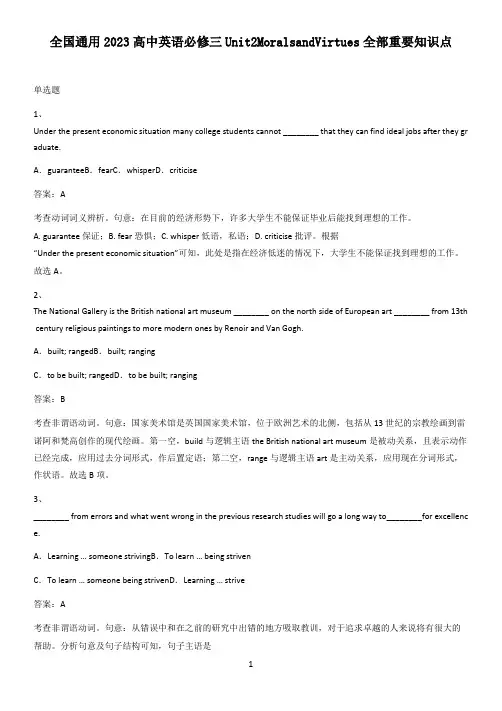
全国通用2023高中英语必修三Unit2MoralsandVirtues全部重要知识点单选题1、Under the present economic situation many college students cannot ________ that they can find ideal jobs after they gr aduate.A.guaranteeB.fearC.whisperD.criticise答案:A考查动词词义辨析。
句意:在目前的经济形势下,许多大学生不能保证毕业后能找到理想的工作。
A. guarantee 保证;B. fear恐惧;C. whisper低语,私语;D. criticise批评。
根据“Under the present economic situation”可知,此处是指在经济低迷的情况下,大学生不能保证找到理想的工作。
故选A。
2、The National Gallery is the British national art museum ________ on the north side of European art ________ from 13th century religious paintings to more modern ones by Renoir and Van Gogh.A.built; rangedB.built; rangingC.to be built; rangedD.to be built; ranging答案:B考查非谓语动词。
句意:国家美术馆是英国国家美术馆,位于欧洲艺术的北侧,包括从13世纪的宗教绘画到雷诺阿和梵高创作的现代绘画。
第一空,build与逻辑主语the British national art museum是被动关系,且表示动作已经完成,应用过去分词形式,作后置定语;第二空,range与逻辑主语art是主动关系,应用现在分词形式,作状语。
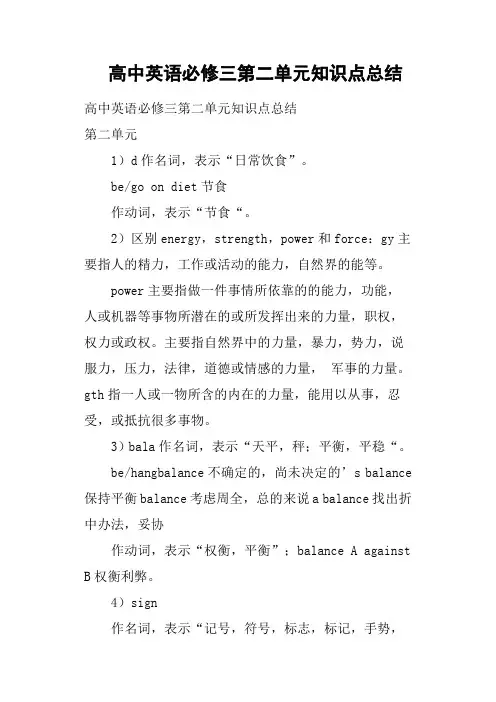
高中英语必修三第二单元知识点总结高中英语必修三第二单元知识点总结第二单元1)d作名词,表示“日常饮食”。
be/go on diet节食作动词,表示“节食“。
2)区别energy,strength,power和force:gy主要指人的精力,工作或活动的能力,自然界的能等。
power主要指做一件事情所依靠的的能力,功能,人或机器等事物所潜在的或所发挥出来的力量,职权,权力或政权。
主要指自然界中的力量,暴力,势力,说服力,压力,法律,道德或情感的力量,军事的力量。
gth指一人或一物所含的内在的力量,能用以从事,忍受,或抵抗很多事物。
3)bala作名词,表示“天平,秤;平衡,平稳“。
be/hangbalance不确定的,尚未决定的’s balance 保持平衡balance考虑周全,总的来说a balance找出折中办法,妥协作动词,表示“权衡,平衡”;balance A against B权衡利弊。
4)sign作名词,表示“记号,符号,标志,标记,手势,迹象,指示牌”等。
作动词表示“签名,签署,示意,做手势”。
gn of 作为……的记号;表示……的。
magn of没有……的样子(迹象),没有表示…… sign for签约应聘或受雇sig签收某物sign sb on/up使某人签约受雇sign up(for sth)注册参加(俱乐部,课程)5)siggh over… 为……叹息sigh for想念,思念sigh out/边叹息边说出……6)slim作形容词,表示“苗条的,纤细的,小的”。
作动词,表示“变细,减肥”。
slim down减肥,缩减。
7)lie作名词,表示“谎言,谎话,假象”是可数名词。
若表示说谎,只能使tell lies或者tell a lie。
a white lie无恶意的谎言w a lie in sb’s face 当面斥责某人说谎give the lie to证明……不真实live a lie过骗人的生活作动词,表示“说谎”。
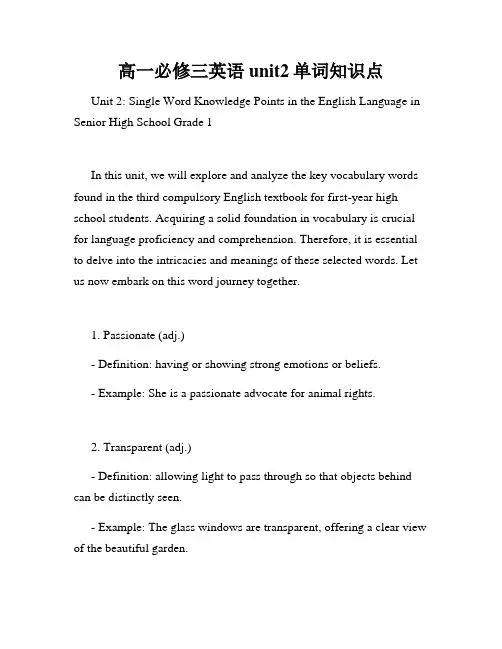
高一必修三英语unit2单词知识点Unit 2: Single Word Knowledge Points in the English Language in Senior High School Grade 1In this unit, we will explore and analyze the key vocabulary words found in the third compulsory English textbook for first-year high school students. Acquiring a solid foundation in vocabulary is crucial for language proficiency and comprehension. Therefore, it is essential to delve into the intricacies and meanings of these selected words. Let us now embark on this word journey together.1. Passionate (adj.)- Definition: having or showing strong emotions or beliefs.- Example: She is a passionate advocate for animal rights.2. Transparent (adj.)- Definition: allowing light to pass through so that objects behind can be distinctly seen.- Example: The glass windows are transparent, offering a clear view of the beautiful garden.3. Determine (v.)- Definition: to officially decide or settle (something) finally.- Example: The judge will determine the outcome of the case.4. Pursuit (n.)- Definition: the act of following or chasing someone or something in order to catch or achieve it.- Example: His pursuit of happiness led him to travel the world.5. Relinquish (v.)- Definition: to voluntarily give up or let go of something.- Example: He had to relinquish his position as team captain due to an injury.6. Adversity (n.)- Definition: a difficult or challenging situation or event.- Example: She overcame many adversities to achieve her dreams.7. Resilient (adj.)- Definition: able to withstand or recover quickly from difficult conditions.- Example: Despite facing numerous setbacks, she remained resilient and never lost hope.8. Assess (v.)- Definition: to evaluate or estimate the nature, ability, or quality of something.- Example: The teacher will assess the students' understanding through a written test.9. Diverse (adj.)- Definition: showing a great deal of variety or difference.- Example: Our school is proud of its diverse student population.10. Comprehension (n.)- Definition: the ability to understand or grasp the meaning of something.- Example: Good reading comprehension skills are essential for academic success.11. Interpret (v.)- Definition: to explain or understand the meaning or significance of something.- Example: His artwork allows the viewer to interpret its meaning in different ways.12. Innovative (adj.)- Definition: introducing new ideas, methods, or technologies.- Example: The company's innovative approach revolutionized the industry.13. Solitude (n.)- Definition: the state of being alone or isolated.- Example: She enjoyed the peaceful solitude of her cabin in the mountains.14. Unanimous (adj.)- Definition: fully in agreement or sharing a common opinion.- Example: The team was unanimous in their decision to decline the offer.15. Astute (adj.)- Definition: having or showing an ability to accurately assess situations or people and use it to one's advantage.- Example: The astute businessman made the right investment choices and achieved great success.These are just a few of the vocabulary words presented in Unit 2 of the English language textbook for first-year high school students. By developing a comprehensive understanding of these words, students will enhance both their written and spoken language abilities. Remember to actively incorporate these new words into daily conversations, as practice is key to mastery.。
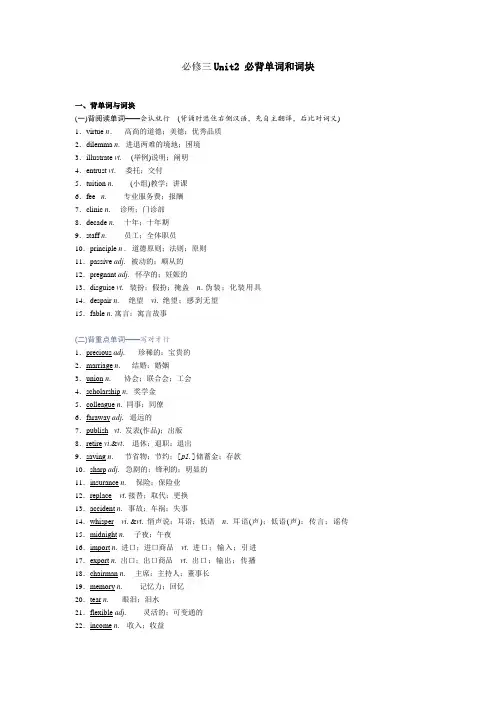
必修三Unit2 必背单词和词块一、背单词与词块(一)背阅读单词——会认就行(背诵时遮住右侧汉语,先自主翻译,后比对词义) 1.virtue n.高尚的道德;美德;优秀品质2.dilemma n. 进退两难的境地;困境3.illustrate vt. (举例)说明;阐明4.entrust vt. 委托;交付5.tuition n. (小组)教学;讲课6.fee n. 专业服务费;报酬7.clinic n. 诊所;门诊部8.decade n. 十年;十年期9.staff n. 员工;全体职员10.principle n . 道德原则;法则;原则11.passive adj. 被动的;顺从的12.pregnant adj. 怀孕的;妊娠的13.disguise vt. 装扮;假扮;掩盖n. 伪装;化装用具14.despair n. 绝望vi. 绝望;感到无望15.fable n. 寓言;寓言故事(二)背重点单词——写对才行1.precious adj. 珍稀的;宝贵的2.marriage n. 结婚;婚姻3.union n. 协会;联合会;工会4.scholarship n. 奖学金5.colleague n. 同事;同僚6.faraway adj. 遥远的7.publish vt. 发表(作品);出版8.retire vi.&vt. 退休;退职;退出9.saving n. 节省物;节约;[pl.]储蓄金;存款10.sharp adj. 急剧的;锋利的;明显的11.insurance n. 保险;保险业12.replace vt. 接替;取代;更换13.accident n. 事故;车祸;失事14.whisper vi. &vt. 悄声说;耳语;低语n. 耳语(声);低语(声);传言;谣传15.midnight n. 子夜;午夜16.import n. 进口;进口商品vt. 进口;输入;引进17.export n. 出口;出口商品vt. 出口;输出;传播18.chairman n. 主席;主持人;董事长19.memory n. 记忆力;回忆20.tear n. 眼泪;泪水21.flexible adj. 灵活的;可变通的22.income n. 收入;收益23.per prep. 每;每一24.therefore adv. 因此;所以(三)背拓展单词——用准才行1.majority n.大部分;大多数→minority n.少数民族;少数派2.complain vi.&vt.抱怨;发牢骚→complaint n.抱怨3.respond vt.回答;回复vi.做出反应;回应→response n.反应;回答;回复4.reject vt.拒绝接受;不录用→rejection n.拒绝接受;否决5.appoint vt.任命;委派→appointment n.约会;任命→appointed adj.约定的;指定的6.elect vt.选举;推选→election n.选举;推选;当选7.scare vt. 惊吓;使害怕vi.受惊吓→scared adj.害怕的;对……感到惊慌恐惧的→scary adj.恐怖的;吓人的8.operate vi.工作;运转;动手术vt.操作→operation n.手术;企业;经营→operator n.操作员9.assist vt.帮助;援助→assistance n.帮助;协助→assistant n.助手;助理;售货员10.harm n.&vt.伤害;损害→harmful adj.有害的→harmless adj.无害的[语境活用]1.I made an appointment (appoint) with the director to gain his approval of a new program.2.Her proposal met with continual rejections (reject), which made her mad.3.Many people voted for him in the election and eventually he was elected as president.(elect)4.None of the students responded to her question; that is to say, her question failed to get a response from any of the students.(respond)5.It was a scary story and children were scared after they heard it.(scare)6.The operator is operating the big machine according to the operation guidance.(operate)7.Eating too much every day is harmful to our health; that is to say, eating too much every day does harm to our health.(harm)8.Tom is an assistant teacher in the college.He often assists the students with their problems andgives assistance to any student in need.(assist)(四)背高频单词——先“记牢”再“用活”,不背绝对不行1.majority n.大部分;大多数2.respond vt.回答;回复vi.做出反应;回应4.replace vt.接替;取代;更换;代替;把……放回原处(五)背短语词块——表达出彩,需多积词块才行单元短语再认再现1.carry sb. through sth.帮助某人渡过难关2.would rather do 宁愿做3.graduate from 从……毕业4.play a key role 发挥关键作用5.care for 关心6.be responsible for 对……负责7.be known as 作为……而出名8.in one's lifetime 在某人一生中9.pass away 去世10.in memory of 作为对……的纪念11.trip over 被……绊倒12.in despair 处于绝望中13.a great deal (of) 大量14.look into 调查;研究15.complain about 抱怨16.be scared of 害怕……重点短语拓展用活1.a great/good deal of许多的;大量的2.in memory of作为对……的纪念(六)背主题写作——好习作就靠“仿效”和“背诵”1、寓言故事的评论2、待人友善的故事Sample Writing“The Stone in the Roadis an old fable about a king who thinks his people are lazy, so he puts a large stone in the middle of the road and hides and waits to see if anyone will try to move it.The author used this story to impress upon readers the need to take personal responsibility for problems in the community. The story was quite successful in achieving its purpose,and I liked it because it had a clear moral.However, while the moral of the story is clear, the actions of the king seemed pointless to me because none of the characters in the story learnt anything For this reason,I think there are better stories that can be used to impress upon people the need for personal responsibility.假定你是李华,你校正在组织英语作文比赛。
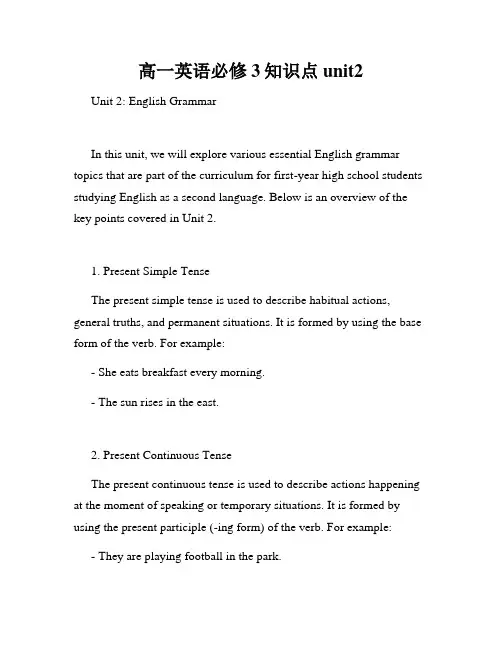
高一英语必修3知识点unit2 Unit 2: English GrammarIn this unit, we will explore various essential English grammar topics that are part of the curriculum for first-year high school students studying English as a second language. Below is an overview of the key points covered in Unit 2.1. Present Simple TenseThe present simple tense is used to describe habitual actions, general truths, and permanent situations. It is formed by using the base form of the verb. For example:- She eats breakfast every morning.- The sun rises in the east.2. Present Continuous TenseThe present continuous tense is used to describe actions happening at the moment of speaking or temporary situations. It is formed by using the present participle (-ing form) of the verb. For example:- They are playing football in the park.- She is currently studying for her exams.3. Past Simple TenseThe past simple tense is used to describe completed actions in the past. Regular verbs form the past tense by adding "-ed" to the base form of the verb, while irregular verbs have their unique forms. For example:- He walked to school yesterday.- They ate pizza for dinner last night.4. Past Continuous TenseThe past continuous tense is used to describe an ongoing action in the past. It is formed by using the past tense of "to be" (was/were) and the present participle (-ing form) of the main verb. For example:- I was watching TV when you called.- They were playing tennis at that time.5. Adverbs of FrequencyAdverbs of frequency describe how often an action occurs. They are commonly used with the present simple tense. Some examples are:- She always arrives on time.- They rarely go to the movies.6. Future TenseThe future tense is used to talk about actions that will happen in the future. It can be formed using "will" followed by the base form of the verb or by using "be going to" followed by the base form of the verb. For example:- I will visit my grandparents next weekend.- They are going to have a party next month.7. Modal VerbsModal verbs are auxiliary verbs used to express ability, possibility, necessity, permission, and advice. Some commonly used modal verbs include can, could, may, might, must, shall, should, will, would. For example:- You must finish your homework before watching TV.- She should study for the test if she wants to do well.8. Relative ClausesRelative clauses provide additional information about a noun in the main clause. They are introduced by relative pronouns such as who, whom, whose, which, and that. For example:- The book that I bought is very interesting.- The girl who is sitting next to me is my best friend.These are the main grammar points covered in Unit 2 of the first-year high school curriculum. Understanding and practicing these concepts will significantly improve your English language skills. Make sure to review and apply them in your speaking and writing to enhance your overall proficiency.。
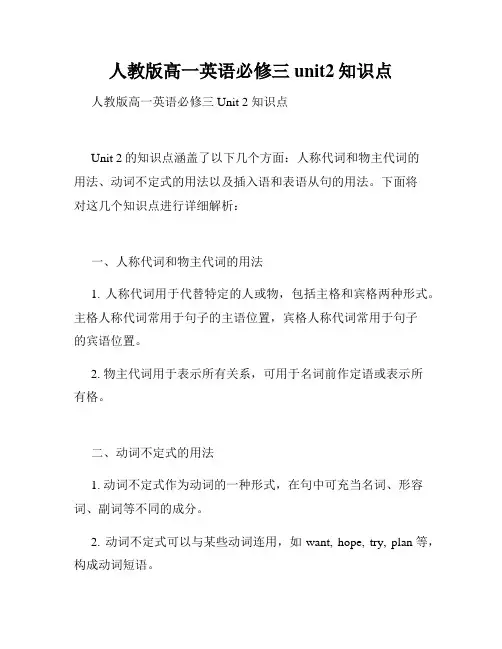
人教版高一英语必修三unit2知识点人教版高一英语必修三Unit 2 知识点
Unit 2的知识点涵盖了以下几个方面:人称代词和物主代词的
用法、动词不定式的用法以及插入语和表语从句的用法。
下面将
对这几个知识点进行详细解析:
一、人称代词和物主代词的用法
1. 人称代词用于代替特定的人或物,包括主格和宾格两种形式。
主格人称代词常用于句子的主语位置,宾格人称代词常用于句子
的宾语位置。
2. 物主代词用于表示所有关系,可用于名词前作定语或表示所
有格。
二、动词不定式的用法
1. 动词不定式作为动词的一种形式,在句中可充当名词、形容词、副词等不同的成分。
2. 动词不定式可以与某些动词连用,如want, hope, try, plan等,构成动词短语。
三、插入语的用法
1. 插入语是句子中的一种修饰成分,用于补充或强调某个句子成分,常置于句子中间或两个逗号之间。
2. 插入语可以是一个词、一个短语或一个从句。
四、表语从句的用法
1. 表语从句用来说明或补充主语或宾语的意思,一般由连词that, whether, if等引导。
2. 表语从句在结构上与主句相互独立,从句内部有自己的主语和谓语。
以上就是Unit 2的主要知识点,通过学习和掌握这些知识点,我们可以更好地理解和运用英语语法,提高我们的英语水平。
希望本篇文章对你的学习有所帮助。

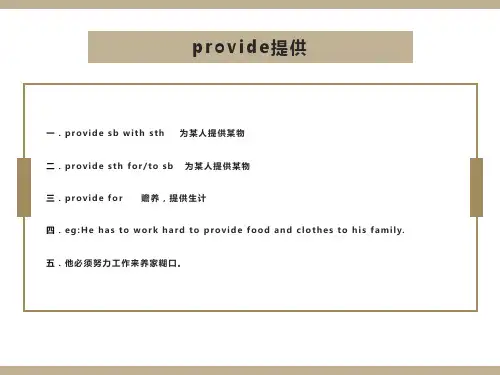
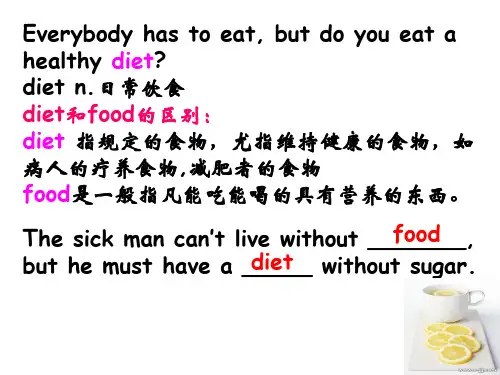
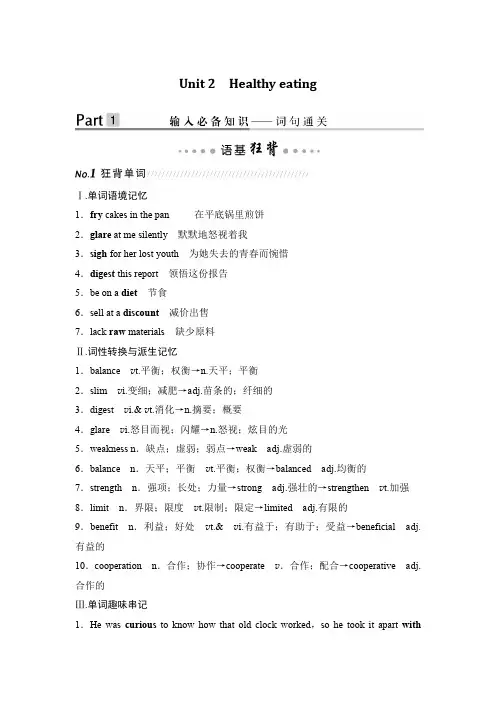
Unit 2Healthy eatingⅠ.单词语境记忆1.fry cakes in the pan 在平底锅里煎饼2.glare at me silently 默默地怒视着我3.sigh for her lost youth 为她失去的青春而惋惜4.digest this report 领悟这份报告5.be on a diet节食6.sell at a discount减价出售7.lack raw materials 缺少原料Ⅱ.词性转换与派生记忆1.balance v t.平衡;权衡→n.天平;平衡2.slim v i.变细;减肥→adj.苗条的;纤细的3.digest v i.& v t.消化→n.摘要;概要4.glare v i.怒目而视;闪耀→n.怒视;炫目的光5.weakness n.缺点;虚弱;弱点→weak adj.虚弱的6.balance n.天平;平衡v t.平衡;权衡→balanced adj.均衡的7.strength n.强项;长处;力量→strong adj.强壮的→strengthen v t.加强8.limit n.界限;限度v t.限制;限定→limited adj.有限的9.benefit n.利益;好处v t.& v i.有益于;有助于;受益→beneficial adj.有益的10.cooperation n.合作;协作→cooperate v.合作;配合→cooperative adj.合作的Ⅲ.单词趣味串记1.He was curious to know how that old clock worked,so he took it apart withcuriosity and examined it curiously.他对那个老钟表是如何工作的很好奇,因此,他好奇地把它拆开了并好奇地研究起来。
2.The tall man was a spy,who had been given the task of spying on the woman and spying out her identity.那个高个子男人是个间谍,他受命监视那个女人并且查清楚她的身份。
Part 1. Warming up1. diet n.日常饮食;食物It is important to have a balaneed , healthy diet.均衡、健康的日常饮食很重要。
搭配be ona diet在节食go on a diet节食put sb.on a diet限制某人的饮食①No sugar in my coffee,please;I' m dieting.请不要给我的咖啡放糖,我在节食。
②(牛津P552)l decided to go_on_a_diet before my holiday.我决定在休假前节食。
③It is important to have_a_balanced,healthy_diet.拥有均衡、健康的饮食很重要。
④The doctor put him on a diet after operation.手术之后,医生规定了他的饮食。
2. What will happen to you if you don ' t eat a balaneed diet?假如你的饮食不均衡会怎么样?balanee n平衡;天平v.平衡;权衡I think it ' s important for a college student to have a baboitw e en study and a social life. 我认为一个大学生在学习与社会生活之间保持平衡是很重要的。
You have to bala nee the adva ntages of livi ng dow ntow n aga inst the disadva ntages.你必须权衡住在市中心的利弊。
On balanee , the company has had a successful year总的来说,公司这一年是成功的。
根据提示,完成下列句子。
(1) ____________________________________________________________ Seeing a car coming at a crossing, she ________________________________________________ (失去平衡)and fell dow n from her bike.(2) ____________________________________________________ The key to learningskating is to ___________________________________________________ (保持平衡).lost her bala neekeep the bala neePart 2. Pre-readi ng, readi ng and comprehe nding1. Wang Pen gwei sat in his empty restaura nt feeling very frustrated.feeling这里是用动词的-ing形式做伴随状语。
Unit 2 Morals and Virtues重点知识归纳总结(单词+短语+句子+语法)一、重点单词和短语1. carry sb through sth 帮助某人渡过难关教材原句These words of Dr Lin Qiaozhi give us a look into the heart of this amazing woman, and what carried her through a life of hard choices.林巧稚医生的这番话让我们可以窥见这位了不起的女性的内心世界,以及是什么支持她度过充满艰难抉择的一生。
●Her confidence carried her through.自信心帮助她渡过了难关。
《朗文当代》联想拓展含有carry的其他常用短语carry on继续carry out执行;实行●It was important to carry out the work quickly.赶快开展这些工作是重要的。
2. majority n.大部分;大多数教材原句At age 18, instead of following the traditional path of marriage like the majority of girls, she chose to study medicine.18岁时,她没有像大多数女孩那样遵循传统的婚姻道路,而是选择了学医。
常用搭配be in the majority占多数the majority of... =most (of)... 大多数……●In the nursing profession, women are in the majority.女性在护理行业中占大多数。
特别注意当“the majority of+名词”作主语时,其后的谓语动词的数取决于of之后的名词;当the majority单独作主语时,如果强调整体,谓语动词用单数形式,如果强调个体,谓语动词用复数形式。
高一必修三英语课本知识点高中英语必修三是学习英语的基础课程之一,它包含了许多重要的知识点。
本文就将逐一介绍必修三英语课本的知识点。
第一单元:Unit 1 Friendship本单元主要介绍了如何表达和描述友谊。
其中包括表示情感的形容词和副词的用法,如“close”,“loyal”,“honest”,以及在描述朋友特质时常用的短语,如“a good listener”,“someone you can rely on”。
第二单元:Unit 2 English around the World本单元主要介绍了英语在世界范围内的使用情况。
包括介绍英语是世界上最常用的第二语言,以及英语的发展历程和方言。
同时,还学习了一些与英语相关的名词和短语,如“mother tongue”,“native speaker”。
第三单元:Unit 3 Travel Journal本单元主要介绍了如何写旅行日记。
学生们将学会用过去时来记录旅行中的经历,以及如何使用适当的词汇和句式来描述旅行中的景点和感受。
第四单元:Unit 4 Earthquakes本单元主要介绍了关于地震的知识。
学生们将学会描述和解释地震的原因、影响以及如何在地震发生时保护自己。
此外,还掌握了一些有关地震的专业术语。
第五单元:Unit 5 Nelson Mandela—a modern hero本单元主要介绍了南非前总统纳尔逊·曼德拉的生平事迹,以及他的贡献。
通过学习这一单元,学生们将增加对历史人物和社会运动的了解,并学会使用相关的词汇和短语进行描述。
第六单元:Unit 6 Life in the future本单元主要介绍了关于未来生活的设想和预测。
学生们将学会如何运用一般现在时和一般将来时来描述未来的生活方式和科技发展。
第七单元:Unit 7 Book shops本单元主要介绍了有关书店的知识,如如何向书店店员咨询和推荐,课本中还包括了一些有关书籍类型和出版过程的词汇和表达方式。